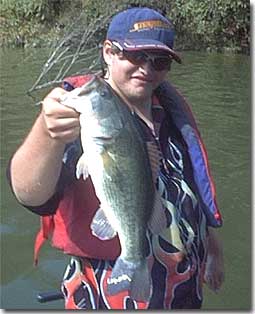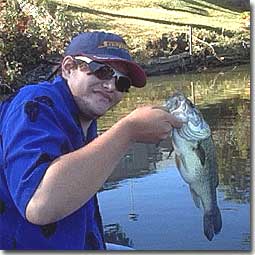Successful Fall Bass Fishing
Successful Fall Bass Fishing
By Richard Sims
Okay, I have been doing the usual lately. Fishing and reading. Every time a new season rolls around I check out fishing articles on the particular season. I have read several on fall fishing and they all basically talk about the same thing. The fall feed. Yes, the fall feed is great, and yes we can always take advantage of it as bass feed up for the winter ahead, but it does not always promise easy or fast fishing. Sometimes fall can produce some of the toughest days of the year. Hopefully with this article I can help you overcome the fall season on both "fast" days and tough days. Hopefully I can cover some things that most other fall articles don't. The Shad Factor This recurs in every single article I have read. Chase the shad and you have found the bass. Well.. yes for the most part this is very true. But unless you're always fishing shallow, crystal clear water, or you can see shad jumping and boiling and bass attacking them, this may be a tough task! How can you tell if the blips on your sonar are shad or perch? Well, basically it doesn't matter. Here's a little secret: It doesn't have to be shad! Bass are literally feeding on just about anything in anticipation for the upcoming winter. Whatever is most available to them is what they will feed on. If you're on a hump on 15ft of water and there's good populations of perch there, then chances are you are going to find bass that are feeding on perch. Now, there will be plenty of schools that will indeed follow the shad into the backs of feeder creeks, etc. and feed on them. This is a very successful technique. But the fact is that some lakes (especially smaller ones) do not have any shad population whatsoever.  On my "practice lake" the main forage in the fall is creek chubs and sucker minnows. Therefore the bass follow them instead. This brings them to drop offs and the mouth of the river that feeds the lake for the most part. There are also some bass that feed predominantly on bluegill in the fall in this lake, so that is yet another pattern we follow to catch them. You see, don't just look for shad. Look for any concentrations of ANY baitfish, and chances are you will find at least some bass. The bigger the baitfish, the bigger the bass more than likely. Big bass don't get big by eating 1" shiners. This is indeed why shad is the most popular baitfish species for bass anglers to chase in the fall months. On my "practice lake" the main forage in the fall is creek chubs and sucker minnows. Therefore the bass follow them instead. This brings them to drop offs and the mouth of the river that feeds the lake for the most part. There are also some bass that feed predominantly on bluegill in the fall in this lake, so that is yet another pattern we follow to catch them. You see, don't just look for shad. Look for any concentrations of ANY baitfish, and chances are you will find at least some bass. The bigger the baitfish, the bigger the bass more than likely. Big bass don't get big by eating 1" shiners. This is indeed why shad is the most popular baitfish species for bass anglers to chase in the fall months. The Importance of Cover Green weeds attract bass in the fall. No doubt about that fact in my books. Most articles will tell you to look for this. They offer oxygen and baitfish which are two things the bass are looking for at this time. Okay, so weeds are a definite fish holder. Now, what if your lake has no green weeds, or at least you can't find any? Well you could drive around searching all day or ask a fellow angler where the green weeds are.. this might work and if it does, more power to you. It doesn't work for me and I don't like to waste time driving around for weeds and I certainly don't like moving in to spots that other anglers have been beating to death. It's time to find secondary areas other than green weeds. First off there's rocks. Remember, in the fall the water cools down and bass' metabolism experiences changes with it. Rocks hold heat better than other structure, so the bass will be holding to the rocks for a slightly warmer temp. Also, baitfish like rocks for the same reason. Where I'm from, we have amazing populations of rock bass. Largemouth and smallmouth eat them! Where are rock bass found? ROCKS! Rip-rap, boulders, rock walls, cement break walls, piers... any of these areas can and usually will hold bass during the fall. In river situations, rock piles or boulders also can serve as current breaks which make an even more obvious spot to catch bass from! If you see baitfish boiling on the surface near a rip-rap bank, don't hesitate to throw topwater baits! This can be some very exciting fall fishing! Another good area to look for bass is wood. Logs, laydowns, brush, boat docks, stumps, standing timber. All of the obvious spots can hold good populations of bass. For me, fall means dock fishing. Find docks with a transition from shallow to deep water, or with rip-rap at the bank and you have found a hotspot!! A big mistake fishermen make in the fall (or any season) is catching one bass off a piece of cover, then moving on to the next. Remember that bass school up in the fall to hunt. Sometimes you can pull 5 or 6 bass, possible more, off of one dock (or other wood structure). The reason I choose docks for the most part in the fall is because although bass are generally not buried in shade for temperature reasons, it still gets sunny in the fall and the bass generally do not want the sun in their eyes. Wood structure can provide a perfect place to hunt while the sun is blaring down on the water. I believe this is why docks are particularly productive on sunny days in the fall. Relation to Structure As for structural areas in the fall, this can vary beyond belief. This is where "looking for the baitfish" is particularly important. Typically for myself, river mouths, creek channels, points and canals have been productive in fall times. Later in the season, they will concentrate even more in these areas. A good quality depth finder can be a valuable asset at this time. Look for baitfish or even the bass themselves on potential fish holding structure. Even when fishing shallow water (8ft or less) it is a good idea to be looking out on the depth finder for schools of baitfish. When you find these baitfish schools, mark the area somehow. It's always important to have some marker buoys with you on board. I also like to take notes on which structure, cover, lure, etc. about the bass that have been caught throughout the season and refer to them next fall. Lure Choices  Basically, try to use lures to match the baitfish in the area you're fishing. If you aren't sure of the baitfish, then chrome or white colored lures are usually a good bet. If the water is stained or muddy, gold, chartreuse, orange or red colored lures can be the bait of choice. In the fall, bass are ready to chase down baits under most situations, but it has too look like the food they are feeding on. I like tandem Terminator T-1 spinnerbaits during the fall as they allow me to cover water effectively. Rat L Traps, jerkbaits, buzzbaits, poppers and even in-line spinners are also good bets during the fall. For fishing heavy cover or weedlines, I like to swim a Terminator Pro's Top Secret Jig around with a pork frog trailer. These are also good baits for fishing docks. Be sure to use a lighter jig (1/4 oz. or less) so it has a slower fall. Bass aren't going to be in lockjaw mode too much during the fall. Another good technique that produced this year was dropshotting Ter! minator Snapback Super Plastics soft jerkbaits around dock structures for bass that missed or short-struck my spinnerbaits. Basically, try to use lures to match the baitfish in the area you're fishing. If you aren't sure of the baitfish, then chrome or white colored lures are usually a good bet. If the water is stained or muddy, gold, chartreuse, orange or red colored lures can be the bait of choice. In the fall, bass are ready to chase down baits under most situations, but it has too look like the food they are feeding on. I like tandem Terminator T-1 spinnerbaits during the fall as they allow me to cover water effectively. Rat L Traps, jerkbaits, buzzbaits, poppers and even in-line spinners are also good bets during the fall. For fishing heavy cover or weedlines, I like to swim a Terminator Pro's Top Secret Jig around with a pork frog trailer. These are also good baits for fishing docks. Be sure to use a lighter jig (1/4 oz. or less) so it has a slower fall. Bass aren't going to be in lockjaw mode too much during the fall. Another good technique that produced this year was dropshotting Ter! minator Snapback Super Plastics soft jerkbaits around dock structures for bass that missed or short-struck my spinnerbaits. All in all, the fall is an excellent time to catch monster bass. I have already had a small taste of what the fall has to offer, and I really can't wait! It could very well be the most exciting time of the year, and the best chance at a trophy fish. Be sure to stay safe, warm and relatively dry out there, and take a kid with you! Good luck and tight lines!
|
